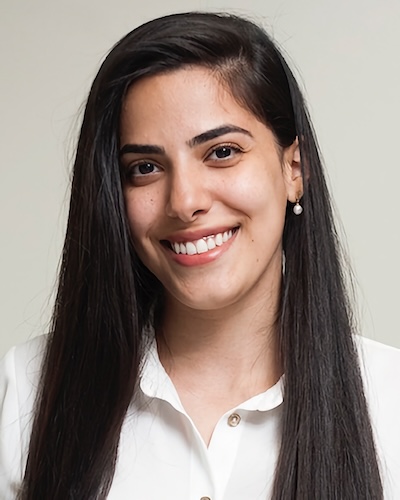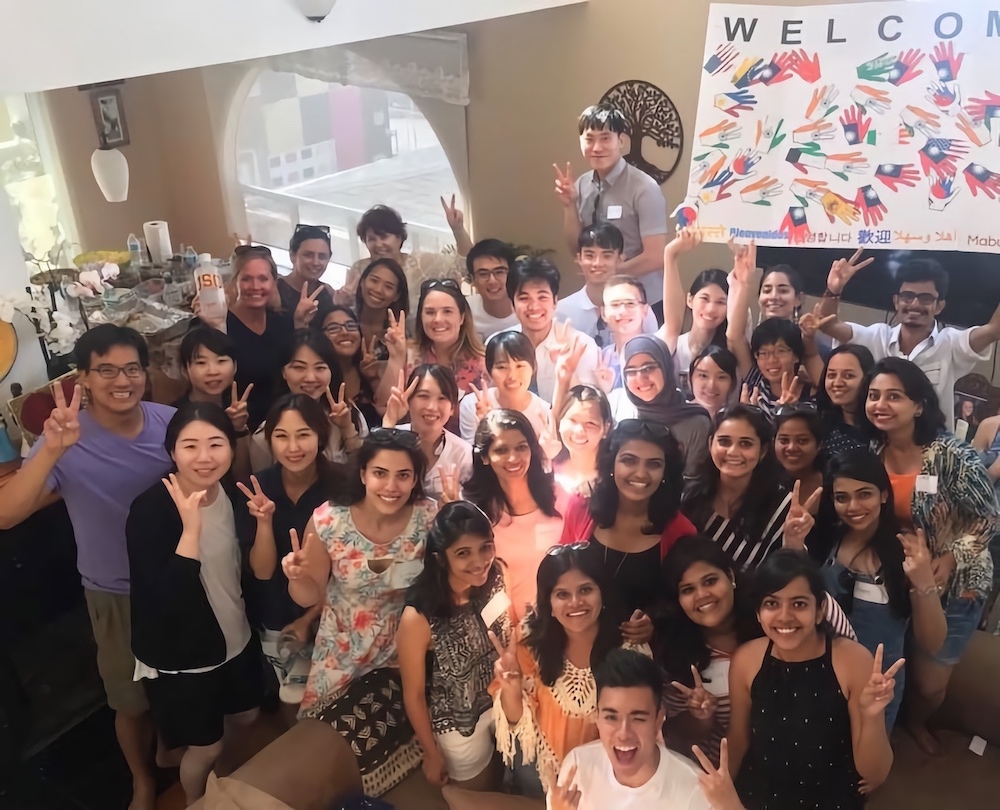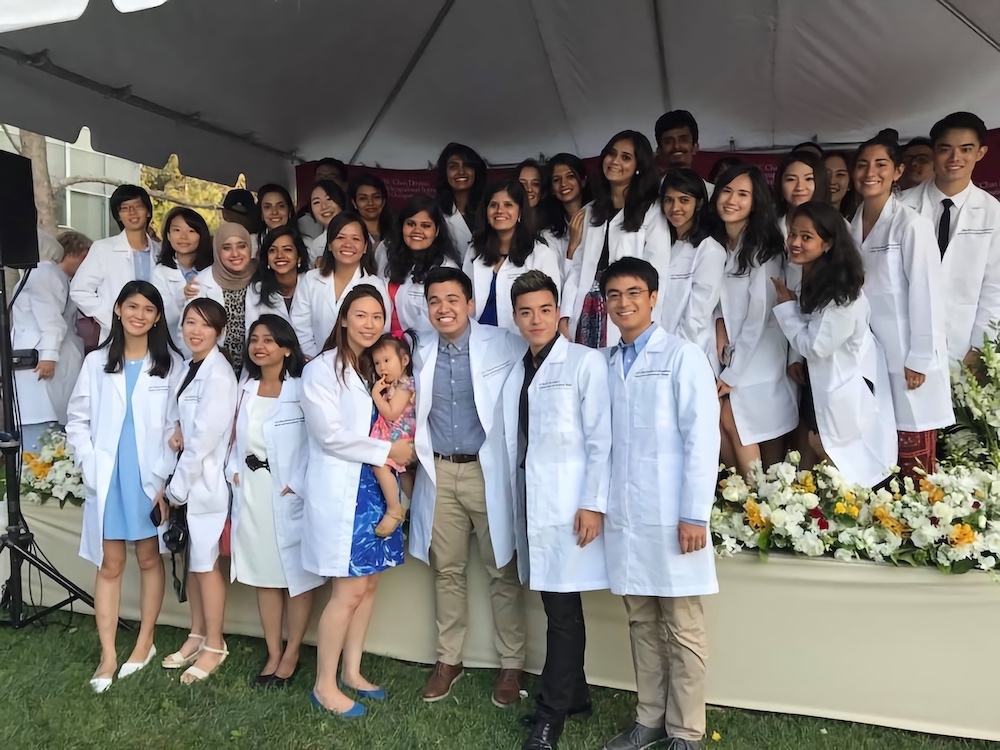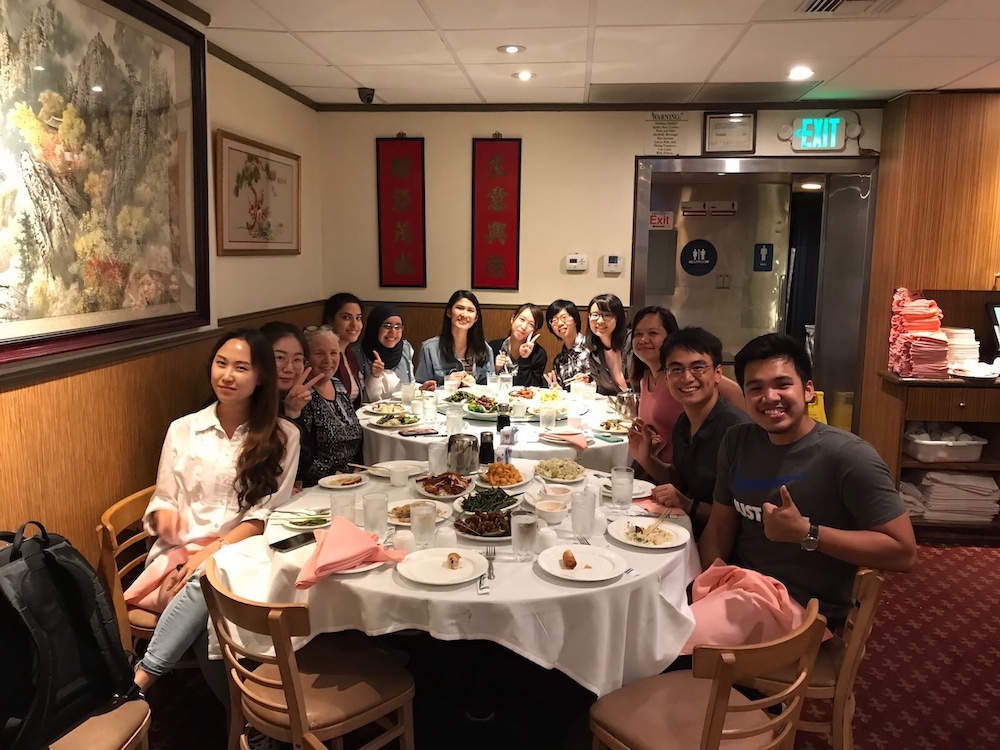Student Blog
Linah

After Graduation: Now What? ⟩
March 19, 2018, by Linah
Admissions Life Hacks What are OS/OT?
Start practicing or further your degree?
NBCOT, OTED, OPT, HIJKLMNOP . . .
As many already know, the NBCOT is the national board exam for occupational therapy. In other words, in order to get licensed as an occupational therapist in the US, passing this test is a requirement. Luckily, USC Chan Division prepares its students well for it by requiring them to sit for the comprehensive exam at the end of the master’s degree. During this exam all the information related to OT is tested, and this serves as an adequate rehearsal for the NBCOT. The method works evident by how USC has maintained a passing rate among students as high as 99%! This option is not limited to US citizens. International students can take advantage of the OPT (Optional Practical Training) year that their F-1 student visa allows, get licensed, and practice OT in the US, too.
In order for an international student to sit for the NBCOT, they would need to go through OTED first. The Occupational Therapist Eligibility Determination (OTED) process requires a few documents that are better brought from back home. Documents like detailed syllabi for each course studied during undergrad, official transcripts, a letter from the undergrad’s program director acknowledging the student’s attendance, and more. The full list of requirements can be found here. All I am saying is, if you’re an international student planning to take advantage of your OPT then better start early (even before starting your post-professional masters) to collect all the required documents. Many of which would be much easier to attain while you’re still in your home country.
OTD vs PhD
Here’s the breakdown: an OTD is generally 2 years long, clinical based, and prepares students to be faculty members and clinicians. It mainly focuses on preparing students to be leaders for the profession. It is a doctoral level degree recognized in the US, however it is yet to be recognized as so in other countries where this degree does not exist yet. It is a great option for those who plan to work in faculty positions that allow clinical practice. The OTD prepares students to be administrative leaders and helps them specialize in emerging clinical fields in OT.
The PhD on the other hand lasts about 4 to 5 years on average, research based, and prepares students to be researchers in the field. This PhD program in USC is literally the first ever PhD in occupational science, and it is fully funded. This means it does not require a tuition, and offers a monthly stipend to its candidates.
Thankfully, being a master’s student in USC offers numerous opportunities to explore one’s interests. This includes visiting clinical sites, volunteering in research labs, and even sitting down with some respectable names in occupational science research who just happen to be part of our faculty!
⋯

Housing 101 ⟩
January 29, 2018, by Linah
Housing and Transportation Living in LA
Moving to a new city is daunting, let alone a new country (In my case). Before venturing to find housing, I think it is important to gauge your exact needs as a MA student before committing to anything. If you are planning to stay in student housing offered by USC, start as early as possible in order to find a space. However, if you plan to stay off campus, then take your time before signing any leases. You would find better options when looking in person than online, but do not scratch off the online hunt just yet because Facebook is full of USC student groups with ads by Trojans who are looking for roommates or to sublease their apartments.
A tip that most students do before settling on an apartment is to rent a place for short stay or stay with friends or family for the first couple of weeks and look for an apartment physically. During the first few weeks, you will know what your class schedule is, and get a sense of how much time you will need on campus, and even get a chance to prioritize the apartment features you will need as an MA student. For example, knowing what time you finish classes at the end of the day could help you determine whether or not you need a car. If you spend long hours on campus but finish early, perhaps using public transportation would be wiser to avoid traffic. If your classes are more spread out through the day and you finish at night, then getting a car would be the wiser choice since it would be safer.
Location, location, location!
A well located apartment is way better than an apartment with a lot of amenities. Both are important, but in the long run being closer to public transportation, school/work, grocery stores, pharmacies, etc, will prove to be more helpful than having an en suite washer/dryer or whatever. When visiting prospective apartments, use Google maps to check the duration of the commute to campus and vice versa. Almost all housing offered by the university is close to the main campus. As an MA student, most if not all classes will be on the Health Sciences Campus. So, choosing to live on the main campus will mean a daily 40 minute commute to Health Sciences Campus (or 20 minutes if you’re driving). This should be taken into account as well as how close are other services to the apartment, like grocery stores or pharmacies or quick bite restaurants. A good tip for this is to use Yelp or Foursquare to see what is near your prospective apartment. Nobody wants to end up stranded or commuting just for groceries at the end of a long day.
Spending extra on rent might mean saving money in the long run
A well located apartment that includes utilities will be expensive. However, a cheaper apartment that is far and does not offer any amenities will cost more on the long run because you will have to compensate for what the apartment lacks with your own money. For example, splurging a bit on rent and getting an apartment that is close to a metro station, includes utilities, and offers maintenance services, and parking for free will relieve you from needing a car for everything, or paying for parking, gas, electricity or even buying some household appliances. Of course, this all depends on your living needs in LA. So, doing the math beforehand is the only way to determine if this will help you cut costs or not. Also, how long you intend to stay in LA is a contributing factor as well when it comes to deciding how long is your “long run”.
Car or no car?
I think this decision depends on your budget, class schedule, and how close to public transportation you are. For budgeting, bear in mind that a car in LA is very useful but can be expensive. The cost does not only entail the actual cost of the car or its rent, but also parking fees, parking permits, gas money, insurance, and possible maintenance fees. All these costs will pile up at the end of every month, and it is important to make sure that your budget can handle it.
If you decide to opt out of getting a car, then USC has got you covered! The USC shuttle covers all USC campuses and is free of charge for all Trojans. The bus routes conveniently pass through Union Station which is one of the biggest train stations in LA that connects most metro lines. As a USC student you could also get a UPass, which is a metro card that is purchasable at a discounted flat rate at the beginning of every semester. I understand that LA has a reputation of being an “unwalkable” city, but since the Health Science Campus is located so close to downtown LA, public transportation suffices.
⋯

Personal Statements: What Helps? ⟩
November 21, 2017, by Linah
One of the most stressful things that comes along with applying to undergraduate and graduate programs is writing a personal statement. The rules aren’t that clear when it comes to these things, and everyone has a different perspective on what a personal statement ought to be. I have been working on my own PhD personal statement for the past few weeks and it has been a challenge. Mainly because at this point of the semester my energy levels have been dwindled to a speck, and we still have about 3 more weeks to push through.
Since this is very important to me, I find myself being highly critical of everything I produce. This does not help at all with my time constraints, because I keep throwing out every rough draft I come up with. A feeling that might be familiar to many and counter-productive to all. In an effort to gain better perspective, I ventured on to ask fellow friends and faculty about helpful elements to incorporate in a personal statement. Here are some of the advice I received:
Find A Way To Highlight A Unique Point
For starters, many think it is helpful to separate myself from the rest by highlighting something unique about myself or background or past experience. It helps to try to see things from the admission committee’s perspective, being an international student offers a lot to draw from. A friend recommended to use past work experiences to showcase my own abilities and skills, how well I performed something or highlight skills I mastered during that time. It will not be enough to just state where I worked before, because that information is attainable through the CV attached with the personal statement. No need to be redundant. It would make more sense to talk about with whom I worked and what were my responsibilities during that time, and then mention how that particular experience has shaped me into the occupational therapist I am today.
Describe How The Program Will Help You Achieve Your Goals
A colleague suggested that by talking about my own experiences, I can transition into talking about what the program itself offers to further build on it. This way I am able to specify which courses I am interested in and maybe even professors I am eager to work with. It would also be helpful to write about my own plans for myself in the future and perhaps explain how the program would help me achieve them. This would be a good opportunity to explain why I chose this specific program, because that is an important part of any personal statement.
Make It Personal, But Make Sure To Address The Prompt
I reached out to some of the faculty for advice, and the main piece of advice I got was to view the personal statement as a way to tell the admissions committee who I am. In other words, it is important to demonstrate my personality. To prevent myself from making the statement too personal, I try to always reel back to the prompt provided. This way, I can stay on topic. It is also another point that was mentioned by one of the faculty members here in USC; to make sure I address the prompt.
Have It Reviewed By Friends & Family
In order to make sure I review my personal statement properly, I asked fellow friends or family members to proofread it for me. Their feedback is crucial because from there I can tell whether or not I was able to communicate my thoughts well. It is also an effective way to weed out any spelling or grammatical errors, which can really dampen a personal statement if not attended to.
Lastly, the gist of the advice I got was to make a good case for myself as to why I should be accepted. This means writing compelling arguments and making sure to back them up with evidence from my resume or recommendation letters. In other words, a personal statement is what ties the entire application together, so better make it worth it.
⋯

What’s It Like To Be An MA1 Student? ⟩
October 20, 2017, by Linah
One of the unique things about the Post-Professional Program in USC is its own students. Most (if not all) are international students, who either just graduated with an occupational therapy undergraduate degree, or have already worked as OT’s for a while in their own countries. It is a great opportunity for students to connect with occupational therapists from every continent, and learn about how occupational therapy is perceived globally.
Being in the MA1 program and moving to LA was definitely overwhelming in the beginning. Prior to starting this program, I had never crossed the Atlantic before! All I knew about American culture was from Hollywood movies and American media. I had no practical experience about how they do things in this part of the globe. Luckily, this program pays special attention to cultural differences and has dedicated student support programs (like Global Initiatives) to help soften the culture shock.
As soon as I arrived I was invited to a barbeque on the beach at one of the faculty’s homes. It was a great way to get to know some of the faculty who were in attendance, and get familiarized myself with fellow students. We played games on the beach and ate good food, which was wonderful. Definitely was needed after the stress of moving to LA and starting school.
Then to add to the fun, all MA1 students were invited to be part of the White Coat Ceremony. Where each student was presented with their own white coat embroidered with the Chan Division logo. This was a great gesture by the division to induct us into the profession of occupational therapy in the US. It was a cool way to include us into the OT family in USC and make us feel that we are part of it. Especially, that most MA1’s (myself included) come from countries where OT is still emerging. So, they spend more time explaining what OT is than they spend being commended for being part of it. We got to meet each other’s families and mingle with our professors and faculty, which made the day all the more wonderful.
The faculty themselves are such kind individuals, and their hard work to make sure they provide the best education possible really shows. Not only is it obvious during class, but they also invite us to socialize outside of class as well. Dr. Sharon Cermak invited us to dinner at one of her favorite Chinese restaurants in LA. It was good food, good company, and great conversation. Being offered the opportunity to have dinner with one of the 100 most influential people in occupational therapy, is surreal to say the least.
The university really tries to ensure that all of its students are catered to and heard. The support services, financial services, and the free services that students are able to access for just being part of USC! It is a wonderful program to be a part of, and I encourage anyone who sees a master’s in OT in their horizon to look into USC as an option. No need to be intimidated if you’re coming from far away, because everyone here treats you like family.
⋯

Why Did I Become an Occupational Therapist? ⟩
October 6, 2017, by Linah
Ever since I was little I loved helping people and found value in standing up for those who need it. I grew up in a household of doctors, so I have had a good idea about medicine and loved the science itself. Yet, I never saw myself as doctor. I found occupational therapy by accident. It was a new major in my university and when the time came to choose a specialty, I chose it based on eliminating other medical specialties. I did not know what occupational therapy is until my first class after I majored in it. And ever since, it was a love story for the ages. In occupational therapy I find room to be creative while still validating my ideas with scientific measures. It equips me as a practitioner with the knowledge needed to fully understand a client’s medical problem then provides the tools to find the best solution there is for that particular client.
Through offering customized practical solutions, occupational therapists are able to bridge the gap between culture and medicine on a client by client basis. And what better way is there to help implement change in social attitudes about health and disabilities? Another thing I love about occupational therapy is how it aims to empower its clients. The best way to represent a certain demographic is by enabling them to speak for their own. By educating them about their conditions, rights, and preparing them to face their societies with strength. As an occupational therapist I believe I am capable of doing so. I feel blessed to have found a career as enjoyable, and meaningful as occupational therapy.
⋯








